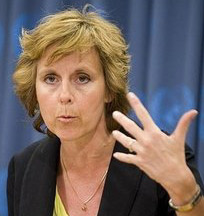 Connie Hedegaard, the livewire Danish Minister for Climate and Energy (yes they are twinned in Denmark – would that they still were in NZ), will not be to blame if the Copenhagen talks, which she is to host, founder. I have been watching the BBC’s Hard Talk programme the last couple of evenings. Interviewer Stephen Sackur has been to Greenland, to Ilulissat, where Hedegaard had invited some 30 ministers on climate change to an informal conference at a place where the effects of global warming on Greenland ice flow are all too apparent. She explained to Sackur in the excerpt from this interview  (second clip down the page – the first is only introductory) her hope that, in remote and secluded Ilulissat, the ministers, working in the knowledge that everything was off the record, would find some trust and common ground. Continue reading “Ice concentrates ministerial minds”
Connie Hedegaard, the livewire Danish Minister for Climate and Energy (yes they are twinned in Denmark – would that they still were in NZ), will not be to blame if the Copenhagen talks, which she is to host, founder. I have been watching the BBC’s Hard Talk programme the last couple of evenings. Interviewer Stephen Sackur has been to Greenland, to Ilulissat, where Hedegaard had invited some 30 ministers on climate change to an informal conference at a place where the effects of global warming on Greenland ice flow are all too apparent. She explained to Sackur in the excerpt from this interview  (second clip down the page – the first is only introductory) her hope that, in remote and secluded Ilulissat, the ministers, working in the knowledge that everything was off the record, would find some trust and common ground. Continue reading “Ice concentrates ministerial minds”
Tag: Copenhagen
People talkin’
 With the first week of 2020 target consultations out of the way, here are a few reflections on what I heard in Christchurch, what happened elsewhere, and what the world’s been up to. Perhaps most hearteningly, the G8 nations (USA, Russia, UK, France, Germany, Japan, Canada & Italy) agreed that they would aim at limiting climate change to 2ºC of warming, target 80% emissions cuts for rich nations, and 50% cuts globally. Even if that’s not enough (Ban Ki Moon wasn’t all that impressed), it is at least a start. Meanwhile, the G5 group (China, India, Mexico, Brazil and South Africa), also meeting at L’Aquila in Italy, called for rich nations to adopt a 40% by 2020 target. The international dynamics in the run-up to Copenhagen are all too clear…
With the first week of 2020 target consultations out of the way, here are a few reflections on what I heard in Christchurch, what happened elsewhere, and what the world’s been up to. Perhaps most hearteningly, the G8 nations (USA, Russia, UK, France, Germany, Japan, Canada & Italy) agreed that they would aim at limiting climate change to 2ºC of warming, target 80% emissions cuts for rich nations, and 50% cuts globally. Even if that’s not enough (Ban Ki Moon wasn’t all that impressed), it is at least a start. Meanwhile, the G5 group (China, India, Mexico, Brazil and South Africa), also meeting at L’Aquila in Italy, called for rich nations to adopt a 40% by 2020 target. The international dynamics in the run-up to Copenhagen are all too clear…
Reports from this week’s 2020 target consultation meetings suggest that Nick Smith and Tim Groser (replaced in Christchurch by Adrian Macey, NZ’s climate ambassador) have had to face up to pretty solid support for a 40% target. Greenpeace laid on a star-studded night in Auckland (Jim Salinger told me today he enjoyed his date with Lucy Lawless), and there were certainly plenty of Sign On and 350.org people in the Christchurch session, as well as another voluble Gareth. The ODT and 350.org.nz report that Dunedin was much the same.
My reactions to Nick Smith’s presentation in Christchurch were mixed. He made all the right noises about supporting action, and emphasised that he was willing to work with Labour to achieve a lasting policy consensus — which is a key step in delivering certainty on the long term direction of policy. I have no doubt, given his comments, that an emissions trading scheme will emerge from the ETS Review process, but remain somewhat sceptical about how watered-down it will be. Smith was too keen to emphasise how hard it would be to make emissions cuts, yet did little more than pay lip service to the carbon sink side of the equation, and seemed able to quote at will from the Greenhouse Policy Coalition’s recent “40% will be too expensive” economic forecast.
I sat with AndrewH, and saw more than a few familiar faces in the crowd. It may have been the only public meeting in NZ history when two alumni of St Catherine’s College made short speeches (hi Rhys). Did I imagine seeing Smith and Macey sit up a little when I challenged them to move from 50 by 50? Overall, I was impressed with the passion of the contributions made from the floor, except possibly for the poor soul who spoke last. He spoke glowingly of Ian Wishart’s Air Con (to a smattering of polite boos), only to be advised by the Minister that Gareth Morgan’s Poles Apart was the better, and more accurate, reference.
The targets roadshow continues next week with public meetings in Hamilton, Napier, New Plymouth and Nelson. The ministers also have a session at the Institute of Policy Studies at VUW on the 15th which is by invitation only (I’d love to hear the proceedings) and a meeting with the Iwi Leadership Group. You can make submissions direct to Nick at n.smith AT ministers.govt.nz, and he will be taking part in a webcast panel discussion live online on Monday 20 July at 7-30pm here. Questions in advance to: 2020target AT mfe.govt.nz. No excuses. Make your voice heard.
Copenhagen 6: taking up the challenge
 The earlier sections of the Copenhagen congress synthesis report are, in this final section, summed up in forthright terms: “business-as-usual is deadâ€. Small marginal changes to the way society currently operates socio-economically and technologically won’t keep climate change within the 2 degree guardrail. Section 5 of the report affirmed that the tools are available for the transformation needed. Section 6 focuses on how societies can be engaged in making the transition to a more sustainable future. This has to be done on many scales, from individual to institutional and governmental, and at many levels, from changes in everyday behaviour to a reexamination of core values, beliefs and worldviews. It lies in the domain of the humanities and social sciences, which were represented at the congress.
The earlier sections of the Copenhagen congress synthesis report are, in this final section, summed up in forthright terms: “business-as-usual is deadâ€. Small marginal changes to the way society currently operates socio-economically and technologically won’t keep climate change within the 2 degree guardrail. Section 5 of the report affirmed that the tools are available for the transformation needed. Section 6 focuses on how societies can be engaged in making the transition to a more sustainable future. This has to be done on many scales, from individual to institutional and governmental, and at many levels, from changes in everyday behaviour to a reexamination of core values, beliefs and worldviews. It lies in the domain of the humanities and social sciences, which were represented at the congress.
The first cut is the deepest
 This week climate minister Nick Smith and international negotiator Tim Groser start their 2020 emissions target roadshow, ostensibly taking the pulse of the nation on the question of what target New Zealand should commit to in the run-up to Copenhagen in December. Much of the argument will undoubtedly centre around the costs of taking action. The government has already signalled it won’t commit to targets likely to damage the economy, but there is a bigger question to consider — what emissions cuts does the world have to consider in order to avoid the worst effects of climate change, and how should New Zealand play its part? Any cost to the NZ economy is only a small part of that overall equation, and (arguably) not the most important. I want to examine what “the science†is telling us about a global goal and how we get there, and what that means for New Zealand. The leaflet produced to accompany the consultation process is pretty feeble in this respect, so I make no apologies for going into some detail here.
This week climate minister Nick Smith and international negotiator Tim Groser start their 2020 emissions target roadshow, ostensibly taking the pulse of the nation on the question of what target New Zealand should commit to in the run-up to Copenhagen in December. Much of the argument will undoubtedly centre around the costs of taking action. The government has already signalled it won’t commit to targets likely to damage the economy, but there is a bigger question to consider — what emissions cuts does the world have to consider in order to avoid the worst effects of climate change, and how should New Zealand play its part? Any cost to the NZ economy is only a small part of that overall equation, and (arguably) not the most important. I want to examine what “the science†is telling us about a global goal and how we get there, and what that means for New Zealand. The leaflet produced to accompany the consultation process is pretty feeble in this respect, so I make no apologies for going into some detail here.
Copenhagen 5: inaction is inexcusable
 The fifth section of the Copenhagen congress synthesis report  asserts that inaction is inexcusable. It calls for a combination of mitigation and adaptation strategies.  There is little that will not be already familiar to those who follow such matters, but the importance of the report is that it articulates a consensus of many professionals and carries a consequent authority. The intention is to give policy makers an up-to-date picture of the means open to us to deal with the reality ahead and to declare them adequate when properly integrated.
The fifth section of the Copenhagen congress synthesis report  asserts that inaction is inexcusable. It calls for a combination of mitigation and adaptation strategies.  There is little that will not be already familiar to those who follow such matters, but the importance of the report is that it articulates a consensus of many professionals and carries a consequent authority. The intention is to give policy makers an up-to-date picture of the means open to us to deal with the reality ahead and to declare them adequate when properly integrated.
